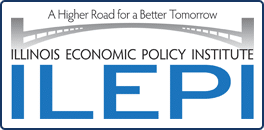With the State of Illinois finally having a new budget for the first time in two years, the Project for Middle Class Renewal at the University of Illinois at Urbana-Champaign and the Illinois Economic Policy Institute evaluated the economic research on policy measures currently under consideration by state lawmakers.
PUBLISHED BY – Frank Manzo IV
JULY 19, 2017
Economic and social science research generally finds that investing in K-12 education and postsecondary education- “human capital development”- and investing in infrastructure- “physical capital development”- are the most effective public policies at improving economic growth. Fiscal sustainability through balanced budgets also allows governments to fund these investments and boosts business confidence.
Investing in public education improves the economy.
- A well-educated workforce raises median wages in a state.
- An extra year of education increases a worker’s earnings by 7-10%.
- A 10% increase in spending on public education leads children to complete more schooling and reduces their chances of living in poverty once they hit adulthood by 3.7% on average.
- In a survey of economics professors and public policy academics from accredited universities in Illinois, 66% say that expanding enrollment in early childhood education programs would improve the state’s employment rate and grow the economy and a majority say the same about raising the share of the workforce with a bachelor’s degree.
Investing in public infrastructure boosts economic growth.
- For every dollar increase in infrastructure spending, the economy improves by $1.57 on average.
- 67% of academic studies find that highway spending has positive impacts on the economy.
Improving an expanding highways, bridges, and public transportation statistically increases the working-age employment rate by increasing connectivity and improving productivity. - In a survey of economics professors and public policy academics from accredited universities in Illinois, 79% think Illinois should increase transportation infrastructure investment.
Other policy changes that have been proposed in Illinois have no, mixed, or limited economic impacts.
1. Peer-reviewed studies demonstrate that “right-to-work” laws have no statistical effect on overall employment in a state economy, but research does find that “right-to-work” tends to reduce wages, limit unionization, and redistribute income from workers to owners.

